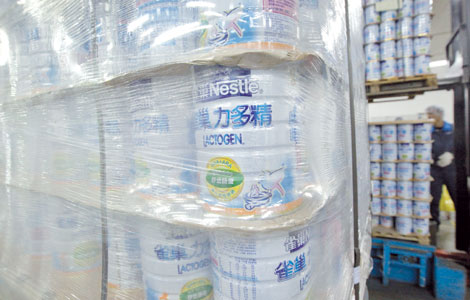|
 |
|
Nestle SA milk powder products awaiting shipment at the company's plant in Shuangcheng, Heilongjiang province. Five foreign brands of infant and toddler formulas together hold about 85 percent of the Chinese market. [Photo / Agencies] |
A baby boom in the current Year of the Dragon in the Chinese zodiac has led to an increase in the price of imported infant formula.
On April 1, Nestle SA raised some of its prices for milk powder shortly before acquiring Pfizer Inc's infant nutrition unit Wyeth milk powder.
That purchase is believed to have made Nestle the largest formula provider in China measured by market share, surpassing Mead Johnson & Co LLC, Dumex - a part of Group Danone - and other rivals, industry analysts said
Explaining the increase, Nancy He, with Nestle (China) Ltd corporate affairs, said the cost of both important raw materials used in the formula and of labor have increased significantly.
"To ensure healthy business development in the long run, we now have to apply a marginal price adjustment for our selected dairy products effective from April 1, 2012," she wrote in an e-mail.
She said the increases are not related to the acquisition of Wyeth.
Local retailers have responded to the higher prices by changing what they charge for goods on their shelves.
"About 70 to 80 percent of Nestle's products have become more expensive by about 8 percent since last month," said a spokesperson for Leyou, a retailer of maternal and baby products. The spokesperson asked not to be named.
Foreign formula brands have raised their prices on several occasions recently.
"They are all big brands," the spokesperson said. "Their prices have all been up."
Meanwhile, imported formula milk has become 10 percent more expensive year-on-year at stores operated by the Japanese supermarket chain Ito Yokado, according to Hou Zhanpeng, who works at one of the company's stores in Beijing.
The industry research company CIConsulting said Dumex had held the largest portion of the Chinese formula market as of July 2010, taking up 16.7 percent of it, followed by Mead Johnson, with 12 percent of the market, and Nestle, with 10.5 percent.
In the fourth position was Abbott Laboratories, which had 7.2 percent of the market, and Wyeth, with 4.7 percent of the market, was in the fifth position.
After the merger between Nestle and Wyeth, the five big foreign brands of infant and toddler formulas will together hold about 85 percent of the Chinese market for those products, said Song Liang, a researcher with the Distribution Productivity Promotion Center of China Commerce.
"Nestle is going after the middle- and high-end formula market," Song said. "It is a huge market for foreign brands to penetrate."
To many Chinese parents, the Year of the Dragon is regarded as being auspicious. Song said the great demand generated by the current baby boom has given a boost to China's market for baby food.
"High-end foreign formula milk has a great potential to become more popular in the light of the country's recent food safety concerns and families' increasing incomes," he said.
wangzhuoqiong@chinadaily.com.cn
